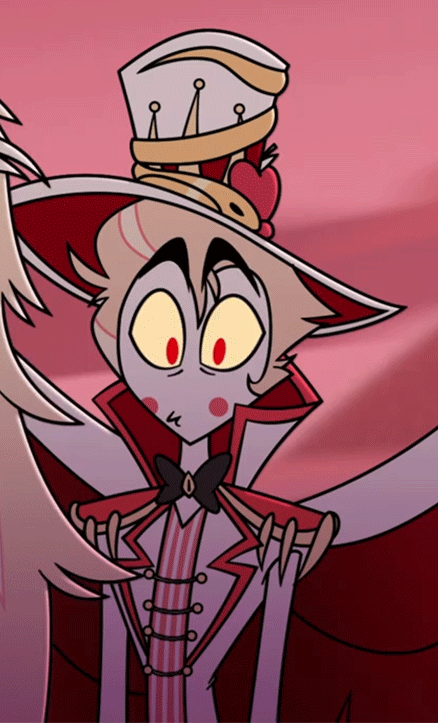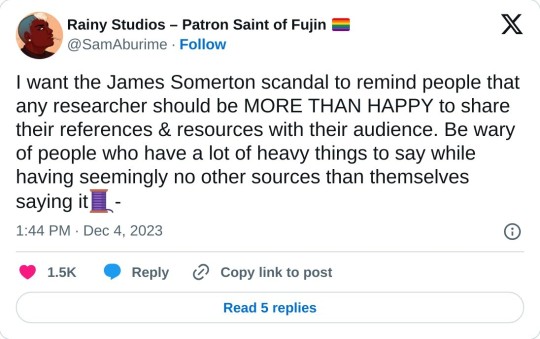#• sources
Explore tagged Tumblr posts
Text
very connected . . lolz

[Text: This fictive is very connected to source.]

[Text: This fictive is detaching from source.]

[Text: This fictive is removed from source.]
Like/Reblog if you save or use!
176 notes
·
View notes
Text

Please Pour Some Rain! (2018) by Taiwanese textile and quilt artist, Lin Hsin-Chen (born in 1974)
31K notes
·
View notes
Text
♱ PNG 4 U. ( Vo. 1599 )










#𝑑͟𝑒͟���͟𝑙͟𝑒͟𝑎͟𝑙. ⠀⠀ ⠀⠀ 𖥟#cute pngs#random pngs#stickers#fakeland#transparent png#recortes#my edits#pngimages#pngdownload#pngfile#transparente#rentry resources#rentry recourses#retro aesthetic#y2k aesthetic#full moon#sources
1K notes
·
View notes
Text
In light of certain recent topics, I’ve been reminded of the 2017 book ‘Norse Mythology’ by Neil Gaiman. It was a nice telling of the more well-known Norse Myths, but there are LOTS of other options out there for people wanting to learn more about Norse Mythology—you don’t have to support that predator to learn about the gods.
Below is a list of some of the other resources that I’ve used. It’s not exhaustive by any measure—just what I’m familiar with and what comes to mind as I sit here at my desk at work. If anyone else has any additional recommendations, please add them to the list!
Norse Mythology for Smart People - norse-mythology.org

This was where I first started when I wanted to learn about Norse Mythology years ago—I literally just typed “Norse Mythology” into google and clicked the first result like a noob. But this site does a really good job of giving information on a wide range of topics within norse mythology as well as vikings in a general sense—everything from different gods, goddesses, creatures, places, and major stories. It’s a solid encyclopedic source that I would recommend to anyone wanting to get general information on the mythology.
“Norse Mythology: The Unofficial Guide” - https://open.spotify.com/show/7F0tD7bStFIDSVEbsnrxuI?si=8ce8f5ccf3a3417d

If podcasts are your jam, the best by far in my opinion is ‘Norse Mythology: The Unofficial Guide’. At the time of me writing this, there haven’t been any new episodes for 6 months, but there are 37 episodes that are about an hour each & range on a variety of topics from cosmology to specific deities to stories like Ragnarok or specific topics like runes. It does a fantastic job of explaining each topic in a way that is both thorough and accessible & honestly I can’t recommend it enough.
The ‘Northern Myths’ Podcast - https://open.spotify.com/show/7KtSJb5DTLSwmfj1BPYY5v?si=fcd6c297cdc1463d

If you want to go deeper into Old Norse texts like the Eddas or the Havamál, the ‘Northern Myths’ podcast is the place to go for a very deep dive/discussion on these texts. The episodes are long and sometimes get a little dry, but they do read these texts directly and then discuss each passage, so it’s a decent place to go for some deep discussion on some of the pillars of Old Norse texts.
Dr. Jackson Crawford - https://jacksonwcrawford.com/

Most people who get into Norse Mythology/History become familiar with Jackson Crawford pretty quick. He’s an expert specifically in linguistics and the Old Norse language—which includes runes—but he also has extensive knowledge on Old Norse & “Viking” history & culture. He’s previously taught at UCLA, UC Berkeley, and University of Colorado, and now has an extensive Youtube channel. He’s also been a consultant for projects like AC:Valhalla. If you have a question about Old Norse & would like to have a soft-spoken, no-nonsense cowboy in the wilds of Colorado explain it to you, this is your new home.
Again, this is by no means an exhaustive list, but it’s a good start. Please please feel free to reblog with any additional sources you’ve used so we can help new friends learn more!
#norse mythology#norse pantheon#norse history#Norse#vikings#reference#research#sources#jackson crawford#podcast#neil gaiman
890 notes
·
View notes
Text
Its kind of ridiculous how difficult it is to find critical intersex literature if you don't know where to look.
That said, here are frequently cited things I've found. For the one's that are behind paywalls, I have a Google Drive folder set up to hold them for access. The only things I leave behind a paywall are books by individual authors. They are not organized at all, I'm sorry.
Intersex Variations Glossary by InterACT
Narrative Symposium: Intersex—Narrative Inquiry in Bioethics (NIB) Volume 5, Number 2, Summer 2015.— Trigger warning for intersex genital mutilation (IGM), sexual assault, and medical trauma—it's honestly a lot but incredibly important. (Drive)
A human rights investigation into the medical "normalization" of intersex people - A report of a public hearing by the Human Rights Commission of the City & County of San Francisco
Surgical Progress Is Not the Answer to Intersexuality - Cheryl Chase. - TW for IGM and images of genitalia (Drive)
The Intersex Roadshow, a blog of Dr. Cary Gabriel Costello - Costello is an intersex trans man and tries to bridge the gap between trans and intersex issues
Beyond Binary Sex and Gender Ideology - Cary Grabriel Costello - Chapter 12 of The Oxford Handbook of the Sociology of Body and Embodiment (Drive)
Transgender and intersex: theoretical, practical, and artistic perspectives (book/textbook) (Drive)
Intersex: Stories and Statistics from Australia (Book) (Open Access)
Fixing sex: intersex, medical authority, and lived experience (Book)
The harms of medicalisation: intersex, loneliness and abandonment (Open Access Article)
Intersex: cultural and social perspectives (Open Access Article)
Office of the United Nations High Commissioner for Human Rights (OHCHR) - Technical Note on the Human Rights of Intersex People. Basically, if you want an easy way to say that doctors are going against human rights by performing IGM.
An experimental philosophical bioethical study of how human rights are applied to clitorectomy on infants identified as female and as intersex (Open Access Article) - People were more likely to support the same surgery on infants labeled as intersex than they were on infants labeled as female.
Caught in the Gender Binary Blind Spot: Intersex Erasure in Cisgender Rhetoric by Hida Viloria - About how cisgender often doesn't accurately express the experiences intersex people have. Costello, mentioned earlier with Intersex Roadshow, coined Ipsogender for this reason.
Introduction for Intersex Activism - A guide for allies
Sex, Science, and Society: Reckonings and Responsibilities for Biologists (Open Access Article)
Contesting Intersex: The Dubious Diagnosis by Georgiann Davis - TW for medical trauma
Spectacles and Scholarship: Caster Semenya, Intersex Studies, and the Problem of Race in Feminist Theory by Zine Magubane (Drive)
Owning Endosex Privilege and Supporting the Intersex Community: WPATH, Intersex Genital Mutilation (IGM), and Sex Variant Bodies by Margo Schulter
The Spectrum of Sex by Hida Viloria and Dr. Maria Nieto
A long way to go for LGBTI equality from the European Union Agency for Fundamental Rights - Before the UK left the EU
If anyone wants to add, feel free! This was the non-medicalized stuff I had saved in Zotero, and definitely not all that's out there.
385 notes
·
View notes
Text
As the link between animal agriculture and climate breakdown becomes clearer, if anything, we are seeing more ordinary people falling over themselves to defend an industry that is destroying our planet, polluting our communities, exploiting animals and human workers. This is especially worrying to see from leftists, in spaces that are supposed to be progressive. I promise you, you do not need to spend your time greenwashing leather and wool, repeating blatant industry propaganda about veganism, 'regenerative agriculture' or whatever other buzzword they're using to sow doubt this week. The industry already spends millions of your dollars to lobby our politicians and influence public opinion; they don't need you to do it for free.
Vox – The greenwashing of wool explained
New Republic – The comforting lie of climate-friendly meat
Guardian – Big Beef’s climate messaging machine
The Breakthrough – Is Feedlot Beef Better for Environment?
International Journey of Biodiversity – Misinformation on Science of Grazed Ecosystems
Food Climate Research Network – Grazed & Confused
Science 2.0 – The regenerative ranching racket
DeSmog – A guide to six greenwashing terms
Truthdig – The backlash to plant-based meats
Independent – Meat & dairy industries downplaying role in climate crisis using tobacco tactics
Guardian – Meat & dairy lobbyists turn out in record numbers at COP28
Greenpeace – How Big Agriculture is borrowing Big Oil’s playbook at COP28
Guardian – Plans to present meat as ‘sustainable nutrition’ at Cop28 revealed
Guardian – Ex-officials at UN farming body say work on methane emissions was censored
Guardian – How UN food body played down role of farming in climate change
QZ – The meat industry blocked the IPCC’s attempt to recommend a plant-based diet
The Times – Red Tractor farms more likely to pollute environment
Influence Map – European meat & dairy industry weaken EU’s climate policies
The Grocer – Meat Industry lobbying behind cultured meat bans
Food Unfolded – Truth, tactics and the mist of meat lobby science
Business Green – Climate lobbying: Are meat and dairy lobbyists the ‘new merchants of doubt’?
246 notes
·
View notes
Text
HELP
ON LUCIFER MORNINGSTAR'S WIKIPEDIA PAGE

WHAT THE FUCK WEDHFCGDHSJEDFVGHFDESW



I'M CRYING WHO WROTE THIS

#hazbin hotel#lucifer morningstar#WHY IS THIS ON HIS ACTUAL WIKI#WHICH ARTICLES CALLED HIM A NEW SEX SYMBOL#LINKS#SOURCES#sidrabbles
914 notes
·
View notes
Text
i'm so infuriated
I'm not Jewish and I'm so infuriated at the world.
I can't imagine how it must feel to be Jewish. Especially as this entire ordeal has made me dive more into educating myself about Jewish history and how the world truly has always blamed everything on the Jews.
How is everything their fault?
Even the crucifixion of Christ has been blamed on the Jews when it was a Roman tradition?
Martin Luther who is known as one of the original reformers in Christianity's history wrote a book called "On the Jews and Their Lies". In which he advocated for burning down synagogues, Jewish homes and if that didn't work, Jewish people!
Apparently, somehow, Jews caused the Black Death despite the fact that the most predominant modern theory is that due to climate change in Asia, rodents began to flee the dried out grasslands to more populated areas which ended up spreading the infected fleas they carried, thus spreading the disease. The fleas infected not just rats but ground rodents in general, so once the rats migrated the fleas could jump to any ground rodent and the infection spread.
Some of the craziest modern stuff though has come mostly from the Middle East (i wonder why)...
Apparently, Israel has remote control sharks that can attack Egyptian civilians and tourists, at least that's what a Governor of Egypt things. source
According to a fundamentalist group of Muslims called the Wahhabis, the Jews have a secret ally they've been conspiring with... the Gharqad tree. A tree, they call it the Jew tree. source Which is identified as either nitre bushes or Lycium which is part of the nightshade family, it's such a thing that the TREE WIKI PAGE TALKS MORE ABOUT THAT THAN THE TREE ITSELF source
Palestine once said that Israel was breeding super rats that could grow twice the size of a normal rat - just to chase Arabs out of Jerusalem, note this was in like 2008, where are these super rats NOW? source
The Nation of Islam (an organization) accused Jews of tricking people into thinking slavery exists??????? Sorry, "still" exists. This was originally in 1996, the gall this motherfucker had in 1996 to say "Where is the proof?" - oh, his name is Louis Farrakhan btw and there is an entire section dedicated to him on the anti-slavery website iabolish.org - his page
Also, Pokémon is a Zionist conspiracy plot to overthrow Saddam Hussein, at least, in 2001 that was what some Iraqi security personal reported. source
listen... I won't lie. I love a good conspiracy theory because to be honest, the amount I trust my government or anyone in authority is so small that just about anything could come out as true and I'd be so un-phased.
but blaming the Jews for everything when they make up an estimated 0.2% of the population versus say the 23% that is Muslim? Which there are approximately 50 Muslim-Majority countries in the world, though depending on sources the exact number differs.
If anything Christianity (32%) and the unaffiliated (16.3%) should be eyed at. Also, how come no one ever gives the folk religion people a hard time? Not that anyone deserves to be given a hard time as long as they aren't hurting anyone, it just boggles my mind to be honest.
sources for numbers cited came from this website: https://worldpopulationreview.com/
anyway, woke up this morning and just wanted to say this cause I'm mad and I want to show my support but also call out stupid people. I'm here to fight for Israel and the Jews, fuck off pro-palestine simps.

#israel#palestine#hamas#politics#gaza#jews#antisemitism#palestine vs israel#jewish#sources#islam#i stand with israel#i stand with the jews#pro jewish#pro israel#i woke up ready to fight today
323 notes
·
View notes
Text
A French writer recalls meeting the Romanov sisters


During WWI, French journalist and writer Amélie de Néry, who went by the pen name Marylie Markovitch, was invited to have a private audience with Tsarina Alexandra Feodorovna. During this meeting, she was introduced to the four Grand Duchesses by the Tsarina.
In January 1916, her recollections were condensed and published in multiple newspapers throughout America and Europe. She wrote:
With a charming smile she took my hand and told me she was very happy to receive a representative of the women of France, who, like their sisters in Russia, had so bravely borne their burden of anxiety during this cruel war. 'Let me introduce you to my daughters,' she said as soon as I thanked her for granting me an audience. 'This is Tatiana.' Grand Duchess Tatiana also shook hands with me and said she was very much interested in meeting a woman journalist for the first time. She is a beautiful girl, with big blue eyes, full of life, illuminating her fair, young face. At this moment the door opened and a young girl, also in the garb of a sister of mercy, entered the room. 'And here is Olga, my little French daughter' said the czarina. Grand duchess Olga is no less beautiful and charming than her younger sister, but she is more calm and there is something of the serenity of the mystic about her. As the czarina referred to her stay in Paris, it seemed to me as if a dreamy expression came into the daughter's dark soulful eyes. ‘Colonel de Vitchkowsky will introduce you to my two other daughters,' said the czarina, as she parted from me to take up her duties in the operating room; and once more I felt the firm grip of her hand. The two little grand duchesses, Marie and Anastasia, were in the convalescent ward. I found that both, wearing plain white dresses and red hats, standing close to an officer who, seated on the window sill, was playing the balalaika. They both shook hands with me and the music went on.

📍SOURCES: Amélie de Néry; LA Raconteuce, ‘Find Writer Finds Czarina Hard At Work’, El Paso Herald newspaper, 6 January 1916. Her full recollections can be found in Amélie de Néry, ‘L’Imperatrice en Voile Blanc’ in Revue Des Deux Mondes, (1916), p. 566
📍PHOTOS: Photograph albums of the Grand Duchesses, public domain; Photographs of Amélie de Néry: Portrait de Mme Marlie [sic] Markovitch, Femina publication, 122, February 1906, p. 75, public domain
#Olga Nikolaevna#Tatiana Nikolaevna#Maria Nikolaevna#Anastasia Nikolaevna#otma#romanov sisters#1916#articles#newspapers#Alexandra Feodorovna#sources#Romanov family#Romanovs
186 notes
·
View notes
Text
List of interesting ressources pertaining to norse paganism, scandinavian folklore and history, and nordic religions in general
These are sources I have personally used in the context of my research, and which I've enjoyed and found useful. Please don’t mind if I missed this or that ressource, as for this post, I focused solely on my own preferences when it comes to research. I may add on to this list via reblog if other interesting sources come to my mind after this has been posted. Good luck on your research! And as always, my question box is open if you have any questions pertaining to my experiences and thoughts on paganism.
Mythology
The Viking Spirit: An Introduction to Norse Mythology and Religion
Dictionnary of Northern Mythology
The Prose and Poetic Eddas (Online)
Grottasöngr: The Song of Grotti (Online)
The Poetic Edda: Stories of the Norse Gods and Heroes
The Wanderer's Hávamál
The Song of Beowulf
Norse Mythology: Myths of the Eddas (Online)
Rauðúlfs Þáttr
The Penguin Book of Norse Myths: Gods of the Vikings (Kevin Crossley-Holland's are my favorite retellings)
Myths of the Norsemen From the Eddas and the Sagas (online) A source that's as old as the world, but still very complete and an interesting read.
The Elder Eddas of Saemung Sigfusson
Pocket Hávamál
Cassell's Dictionary of Norse Myth and Legend (Online)
Cassel's Dictionary of Norse Myth and Legend
Myths of the Pagan North: Gods of the Norsemen
Lore of the Vanir: A Brief Overview of the Vanir Gods
Anglo-Saxon and Norse Poems
Gods of the Ancient Northmen
Gods of the Ancient Northmen (Online)
Norse Mythology - The Gods, Goddesses, and Heroes Handbook: From Vikings to Valkyries, an Epic Who's Who in Old Norse Mythology (A vulgarized and fun read for for newbies!)
Two Icelandic Stories: Hreiðars Þáttr and Orms Þáttr
Two Icelandic Stories: Hreiðars Þáttr and Orms Þáttr (Online)
The Elder Eddas of Saemund Sigfusson; and the Younger Eddas of Snorre Sturleson (Online)
Sagas
Two Sagas of Mythical Heroes: Hervor and Heidrek & Hrólf Kraki and His Champions (compiling the Hervarar saga ok Heiðreks and the Hrólfs saga kraka)
The Saga of the Jómsvíkings
The Saga of King Heidrek the Wise (Online)
The Heimskringla or the Chronicle of the Kings of Norway (Online)
Stories and Ballads of the Far Past OR Stories and Ballads or the Far Past - Translated from the norse (Icelandic and Faroese) with introduction and notes
Stories and Ballads of the Far Past: Icelandic and Faroese
Heimskringla: History of the Kings of Norway
The Saga of the Volsungs: With the Saga of Ragnar Lothbrok
The Saga of the Volsungs (Online. Interesting analysis, but this is another pretty old source.)
The Story of the Volsungs (Online) Morris and Magnusson translation
The Vinland Sagas
Hákon the Good's Saga (Online)
The Saga of Hervör and Heidrek (Online)
The Saga of the Jómsvikings (Online)
History of religious practices
The Viking Way: Magic and Mind in Late Iron Age Scandinavia
Nordic Religions in the Viking Age
Agricola and Germania Tacitus' account of religion in nordic countries
Myths and Symbols in Pagan Europe: Early Scandinavian and Celtic Religions
Tacitus on Germany (Online)
Norse Mythology: A Guide to Gods, Heroes, Rituals, and Beliefs
Seiðr & Shamans: Defining the Myth of Ritual Specialists in pre-Christian Scandinavia (online)
Vǫrðr and Gandr: Helping Spirits in Norse Magic (online)
Scandinavia and the Viking Age
Viking Age Iceland
Landnámabók: Book of the Settlement of Iceland (Online)
The Age of the Vikings
The Vikings (Online. Mind the year of publication, this source is pretty old!)
Gesta Danorum: The Danish History (Books I-IX)
The Sea Wolves: a History of the Vikings
The Viking World
The History of Iceland
Guta Lag: The Law of the Gotlanders (Online)
The Pre-Christian Religions of the North (This is a four-volume series I haven't read yet, but that I wish to acquire soon! It's the next research read I have planned.)
Old Norse Folklore: Tradition, Innovation, and Performance in Medieval Scandinavia
Children of Ash and Elm: A History of the Vikings
The Penguin Historical Atlas of the Vikings by John Haywood
Landnámabók: Viking Settlers and Their Customs in Iceland
Nordic Tales: Folktales from Norway, Sweden, Finland, Iceland and Denmark (For a little literary break from all the serious research! The stories are told in a way that can sometimes get repetitive, but it makes it easier to notice recurring patterns and themes within Scandinavian oral tradition.)
Old Norse-Icelandic Literature: A Short Introduction
Saga Form, Oral Prehistory, and the Icelandic Social Context
An Early Meal: A Viking Age Cookbook and Culinary Oddyssey
Runes & Old Norse language
Uppland region runestones and their translations
Viking Language 1: Learn Old Norse, Runes, and Icelandic Sagas and Viking Language 2: The Old Norse Reader
Five Pieces of Runic Poetry
Corpus poeticum boreale, the poetry of the old Northern tongue from the earliest times to the thirteenth century (online)
Old Norse-Icelandic Literature: A Critical Guide
Eddic to English: A survey of English translations of the Poetic Edda
Catalogue of the Manks Crosses with Runic Inscriptions
Old Norse - Old Icelandic: Concise Introduction to the Language of the Sagas
A Companion to Old Norse-Icelandic Literature and Culture
Five pieces of runic poetry translated from the islandic language: Quotations
Nordic Runes: Understanding, Casting, and Interpreting the Ancient Viking Oracle
YouTube channels
Ocean Keltoi
Arith Härger
Old Halfdan
Jackson Crawford
Wolf the Red
Sigurboði Grétarsson
Grimfrost
(Reminder! The channel "The Wisdom of Odin", aka Jacob Toddson, is a known supporter of pseudo scientific theories and of the AFA, a folkist and white-supremacist organization, and he's been known to hold cult-like, dangerous rituals, as well as to use his UPG as truth and to ask for his followers to provide money for his building some kind of "real life viking hall", as supposedly asked to him by Óðinn himself. A source to avoid. But more on that here.)
Websites
The Troth
Norse Mythology for Smart People
Voluspa.org
Mimisbrunnr: Developments in Ancient Germanic Studies
Icelandic Saga Database
Skaldic Project
Life in Norway This is more of a tourist's ressources, but I find they publish loads of fascinating articles pertaining to Norway's history and its traditions.
Germanic Mythology
Stories for all time: The Icelandic Fornaldarsögur
#ressources#masterpost#heathenry#research#sources#norse paganism#norse gods#spirituality#polytheism#deity work#pagan#paganism#deities#norse polytheism#mythology#eddas#sagas
780 notes
·
View notes
Text

[Text: This alter is fine interacting with “doubles” of themself, regardless of how similar or different they are.]
Like/Reblog if you save or use!
#userbox#this user#system#system stuff#traumagenic system#did#osdd#anti endo#endos dni#mod plush 🌻#undescribed#source#sources
151 notes
·
View notes
Text
YO EUROPEAN HISTORY LOVERS
guys, I must tell you all
if you want/need high quality images or texts from european history
RUN TO https://www.europeana.eu/en!!
I just found out about it today and they have amazing sources
they have things I havent seen anywhere else, also its pretty much all copyright free (great for school work)
xoxo
#history#historical sources#homework help#sources#historical documents#i just spent 2 hours looking at marmont stuff#had a freak out (out of happiness)
121 notes
·
View notes
Text
Guarding your name from the fae in folklore
The idea of fae stealing names is quite recent (I’m a big fan of new, modern folklore, x, y), but the idea that you have to guard your name so no one could (supernaturally) us it against you, is definitely a widespread folk belief. However, I’ve never encountered an actual folktale that says the fae or fairies in particular could have power over you if they knew your name. I’ve been looking for one for a long time (and if you know one please let me know!) but so far I’ve only come up with one example. So let's take a look:
The power of names
Like I said, the power of names is an old belief that shows up all over the world. Sometimes it’s linked with naming ceremonies like baptism. Sometimes hiding the name from others (witches, djinns, etc.) is what will protect you, sometimes the name itself will protect you (like being named after a saint or in reverence of a deity or spirit). Edward Clodd published a huge essay in 1898 investigating how widespread this name guarding practice is and how it links to folklore. Which, while obvioulsy dated, certainly gives an impression of how deep this belief goes (Tom Tit Tot; an essay on savage philosophy in folk-tale, Clodd, E., 1898).
Not all folk beliefs show up in folktales though and protagonists who refuse to tell their name are not a staple of European folklore, whether it concerns fae or other entities. In “The Soul Cages”, collected by T. Crofton Croker it’s even quite the opposite, as the protagonist and a firendly merrow deliberately call each other by their full names (Jack Dogherty and Coomara). And for ages I wasn't able to find a story that actually incorporated the belief of guarding your name against fae, until I read that huge essay.
Hiding your name from the fairies
In his book, Clodd mentions a single folktale in which it is mentioned that the fae are trying to learn someone’s real name. Sadly he does not tell it in full, but since it is the only real example of this concept I’ve able to find so far, I will give the full quote:
While these sheets are passing through the press, my friend Mr. W. B. Yeats hands me a letter from an Irish correspondent, who tells of a fairyhaunted old woman living in King's County. Her tormentors, whom she calls the "Fairy Band of Shinrone," come from Tipperary. They pelt her with invisible missiles, hurl abuse at her, and rail against her family, both the dead and the living, until she is driven well-nigh mad. And all this spite is manifested because they cannot find out her name, for if they could learn that, she would be in their power. Sometimes sarcasm or chaff is employed, and a nickname is given her to entrap her into telling her real name, — all which she freely talks about, often with fits of laughter. But the fairies trouble her most at night, coming in through the wall over her bed-head, which is no laughing matter; and then, being a good Protestant, she recites chapters and verses from the Bible to charm them away. And although she has been thus plagued for years, she still holds her own against the "band of Shinrone." (Clodd, 1889, p. 83-84).
This story fits the concept of keeping your name away from malicious fairies so you cannot truly fall under their power perfectly. Sadly I haven’t been able to find this story in Yeats’ own folklore collection, but it fulfills my criteria even so.
What I have been able to find many examples of, however, is the reverse trope. Namely that knowing a fairy’s name will give you power over them. I thought this only showed up in Rumplestiltskin-type stories, but it seems a little more widespread than that. Which is very exciting to me, and merits its own post. So stay tuned.
#guard your name#fae#faeries#fairies#sources#laura babbles#folklore#irish folklore#I'm very pleased to have finally found a real example#although it seems a firsthand witness account#which is a more unusual way for this type of folklore to present itself#but no less interesting for a late 1800s text
179 notes
·
View notes
Text


The description for Sonic Comic Act 14(Act 18 in the English comic release): Pumpkin Trigger notes the overwhelming power of Silver’s psychokinesis and his brave nature stating that Silver has no regard for his own safety and is willing to sacrifice himself at a moment’s notice.
#silver the hedgehog#miles tails prower#sonic the hedgehog#sonic channel#sonic#sources#official content
171 notes
·
View notes
Text

I posted this to Twitter but it needs to be seen here too.
(Those out of the loop, popular gay YouTube "video essayist" James Somerton was found to plagiarize the large majority (90%+) of this videos word for word. (source))
"I want the James Somerton scandal to remind people that any researcher should be MORE THAN HAPPY to share their references & resources with their audience.
Be wary of people who have a lot of heavy things to say while having seemingly no other sources than themselves saying it because that can be a sign of 3 things:
1) they like to pass off other people's ideas as their own, or
2) they don't actually have reliable or consistent sources supporting what they're saying & want to appear like an authority, or
3) purposefully spreading disinformation
People who genuinely care about research, awareness, and education will gladly share sources and research articles they find with other people, no strings attached. Obviously, the next step is confirming the validity of those sources, but having sources is the bare minimum.
In this age of Do-It-Yourself video essayist "experts" and Influencers, staying diligent and combating misinformation and bias is more important than ever. Get. Those. Citations. Sources, sources sources."
616 notes
·
View notes